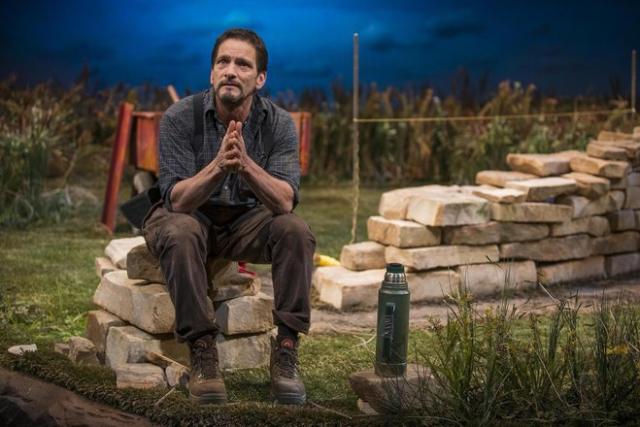
The Milwaukee Repertory Theater makes a bold attempt to focus on one of the most pressing issues of our time — mass shootings in America’s schools — in the world premiere of Joanna Murray-Smith’s American Song. The play’s unusual structure consists of an 80-minute performance followed by a five-minute presentation by a Milwaukee community leader. After intermission, audiences are invited to join small discussion groups. Circles of chairs encircle the lobby as the audience enters. Complimentary wine and coffee are served. The discussion groups are led by friendly staff members of Milwaukee’s Zeidler Center for Public Discussion This is all very different from what audiences typically expect, and there was an air of uncertainty in the opening night crowd. Things settle down quickly as the easier part of the evening begins. Joanna Murray Smith’s one-man play stars seasoned actor James DeVita as a father struggling to cope with his son’s nightmarish act.
The play is set on a gorgeous open prairie (by set designer Daniel Conway) that seems to stretch on forever. The play opens on a brilliantly sunny summer day, with rolling clouds on the horizon (expertly lit by Jason Fassl). James DeVita admires the view but is also focused on a task he started long ago. He is building a half-wall with stones gathered from the property. Instead of relying on mortar, he uses tools and engineering expertise to construct the project, one stone at a time. Significantly, he continues building the wall throughout the play. DeVita, alone on the prairie, talks directly to the audience. He tells us his name is Andy, and he begins a long tale of his life. He talks about meeting the woman who would become his wife. He describes their excitement about adding a son, Robbie, to their family. He tells many stories about Robbie’s early years. He talks about school sports, vacations, and a generally pleasant life. There’s a lot more telling than showing; the latter being one of the strengths of live theater. One wishes all this back-story would lead sooner to the main event of the story. A teenaged Robbie and one of his friends take an arsenal of weapons to their school. They kill nine other children and wound many more before killing themselves. Looking back, Andy can’t see what he obviously missed when Robbie was growing up. Robbie was an exceptionally bright kid with an unlimited future. His middle-class parents could afford to send him to a good college, and that’s what they were planning on doing before Robbie changed everything. “I looked at Robbie and didn’t see a monster, I only saw my son,” he said. The play is sadly topical, as Andy recounts other school shootings ranging from Columbine to Shady Hook. He searches for some connection to what happened to Robbie, but finds none. New York-born actor James DeVita is undoubtedly one of the best storytellers in the Midwest. Yet even he can’t keep the audience riveted on the script, which wanders through reams of pointless details. We hear about the names of all of Andy’s neighbors, and the politics at Andy’s office. We even hear about a brief and ill-advised love affair with the wife of another executive in Andy’s office. (Andy’s marriage is strong enough to survive this.)
Perhaps this chatter is the playwright’s attempt to help the audience “identify” with DeVita’s character. At times, DeVita has our full attention. But the play does sag somewhere in the middle, as the audience impatiently waits for details of what Andy’s son did in school one day. Despite artistic director’s Mark Clements’ fine direction, this is an unwieldy piece of work. It’s especially difficult to relate to DeVita when he links current society to Walt Whitman’s “Leaves of Grass.” One can hardly imagine that a parent in that situation would be thinking such lofty thoughts. It’s a huge intellectual leap for Andy, and one that DeVita tries mightily to conquer.
The shooting isn’t even outlined until the play’s final 10 minutes. DeVita, who was at the office at the time, recalls the facts about how he learned of the event. That said, the play never gets maudlin; it ends with Andy telling us that he and his wife still live in the same house, and still go to the same jobs. They try to be as “normal” as possible, trying not to get derailed by some of the cold stares and insensitive comments from strangers. Although the playwright steers clear from delivering easy answers to the inevitable questions surrounding such events, she doesn’t give us even a hint about why they occur. It’s almost as if she is telling middle-class suburban parents not to be more vigilant about their kids’ behavior, since it probably won’t help, anyway.
One final disappointment in American Song is that it doesn’t address the power of social media. According to his dad, Robbie didn’t seem particularly preoccupied with cell phones and computers. He never posted videos that suggested (or told straight out) what he was going to do. Robbie didn’t even leave a suicide note. If Robbie had reasons for doing what he did, he quietly took them to his grave. It’s an unsatisfying ending to a brave attempt at getting the conversation started about guns and kids.
